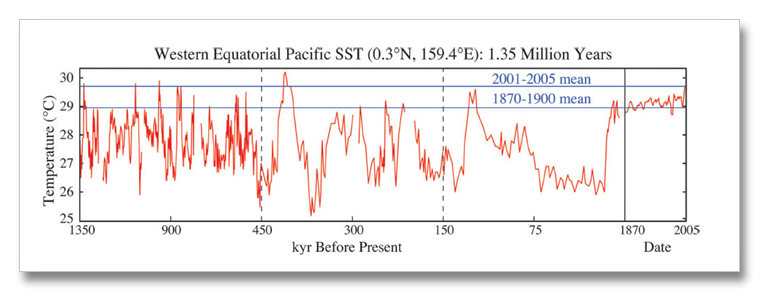During the last interglacial warm period, this study says temps were 2 to 3 degrees warmer. There is considerable disagreement about this. James Hansen says a lot less.
Hmmm… Maybe we are already warmer than when sea level was 24 feet higher. There are numerous different estimates of paleotemperatures, especially the last interglacial. they mostly seem to focus on a degree or two warmer than today, but Hansen’s paper shows that we are warmer today. His comparison of South Pacific Temperatures and Global temperatures is that they are sufficiently similar to say that global temperatures follow South Pacific Temperatures. Another fact that Hansen has brought to life is that mankind is changing concentrations of CO2 in our atmosphere 20,000 times than at any time in the last 65 million years.
What I think is that all of these temperature and sea level analyses are correct. The problem is that CO2 levels are rising so fast that analyses are more or less correct, just the timing is off a wee bit. Twenty thousand times faster is astronomically fast relative to anything that has ever happened before.
It appears to me that if one averages all of the temperature interpretations from the last million years, they all turn out to be about the same. So in Nature Geoscience, Siddall, et. al., have looked at stranded beaches and coral reefs across the world and correlated ice loss from ice sheets to gravity changes (Greenland ice extends 11,000 feet above sea level, Antarctica is 13,000). When the ice sheets melt, they seriously affect the Earth’s gravitational field. So much so that sea level in the north Atlantic and the north central Pacific rises by up to three feet.
But overall, across the planet, there was a two out of three chance that we are in for 25 feet of sea level rise, if this was a normal climate change. But since CO2 concentrations are rising more rapidly than at any time in 65 million years, and given that CO2 concentrations are as high as any time in the last 20 million years, we may be in for a bit more sea level rise is my guess. There is a pretty good consensus that says that about 35 million years ago was when Antarctica started building ice mass.
So since CO2 concentrations are rising faster than any time in the last 65 million years, would it make sense that sea level would rise a bit faster and or a bit more than it did 125,000 years ago when CO2 levels were changing quite normally? And since the rate of change (65 m year ago) and the CO2 concentration (20 m years ago) are a tad beyond the last 125,000 years, how far fetched is it that sea level rise will be greater than it was 125,000 years ago?
Hansen, et. al., Global temperature change, PNAS, September 2006.pdf

